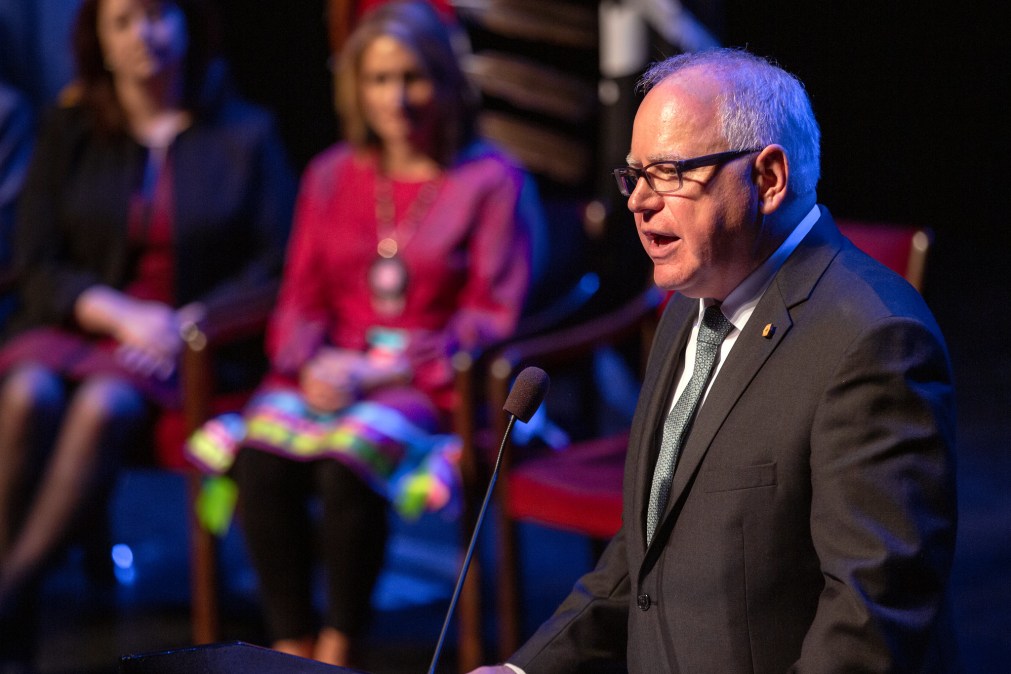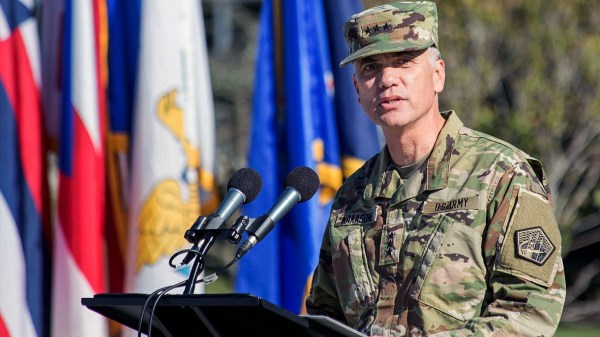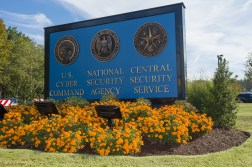The governor’s office says the NSA isn’t involved in the response to Minnesota’s protests. But here’s how it could be.

The office of Minnesota Gov. Tim Walz says the National Security Agency did not provide the state with signals intelligence as its law enforcement agencies responded to protests against the killing of George Floyd. For awhile this weekend, though, the governor stirred up some confusion about whether the intelligence agency could do so.
“No NSA involvement,” a Walz spokesperson told CyberScoop. The Democratic governor was mistaken in suggesting Saturday during a press conference that the U.S. military had provided the state with signals intelligence collected by the NSA, the spokesperson said.
CyberScoop could not independently verify the spokesman’s comment. The NSA deferred comment to the governor’s office.
Generally speaking, the NSA, the Pentagon’s foreign signals intelligence agency, does not target U.S. citizens to collect electronic communications information. But there are specific times when it can. Walz’s comments — combined with speculation about how those legal circumstances might apply to the protests — were enough to fuel questions about the NSA’s involvement.
Walz said Saturday that he had a call with Defense Secretary Mark Esper to discuss military support after protests erupted in Minneapolis in response to the killing of Floyd, an African-American man, by a white police officer earlier that week.
“They also were able to provide their intelligence support of what they’re seeing, what they’re signal intercepting, they have obviously from NSA, from others, massive support to be able to see who these operators are,” Walz said of the military.
It is possible that Walz and military officials discussed the kinds of support the Pentagon could share with Minnesota, including intelligence resources. But during a period of several hours this weekend, the governor’s office did not clarify the comment about the NSA.
“We’re looking at what are the resources they have,” Walz had said about the Department of Defense in general. “Is there signals intelligence that we can get from them?”
NSA work with law enforcement
Here’s how those exceptions could come in: The military was a visible part of the response to the protests. Over the weekend Walz activated thousands of National Guard troops to deploy in Minneapolis to try helping stem the destructive elements of the protests in the city. The Department of Defense had ordered the Army to prepare military forces to deploy in Minneapolis. The NSA would only be engaged in surveilling the protests in Minnesota or elsewhere unless it was tracing a foreign element of interference, Larry Pfeiffer, who previously served at the NSA and CIA, told CyberScoop.
“The only way there could be NSA [signals intelligence] support would be if they had collected foreign intelligence indicating a connection to foreign actors. … Broadly, NSA would not be targeting or directing collection assets against anyone defined as a U.S. person,” Pfeiffer said.
There are channels through which the NSA may share relevant information with law enforcement without breaking the law, Pfeiffer said.
“Any foreign intelligence collected that relates to what’s happening could be shared through established mechanisms for sharing with state, local and tribal officials, usually through sanitized reporting,” Pfeiffer said.
That is, if the NSA is sharing information with local law enforcement, it would still have to adhere to mechanisms to protect the privacy and civil liberties of Americans, and “would still need to comply with minimization procedures,” such as those in a Signals Intelligence Directive called USSID 18, which governs how the NSA minimizes information gathered about U.S. citizens, said Brad Moss, a Washington, D.C.-based attorney with a specialty in national security law.
Labyrinth of legal contours
Walz’s apparent misstatement comes at a time of uncertainty over the future of some provisions of the Foreign Intelligence Surveillance Act (FISA), which requires the government to seek a court order before it collects information on communications of individual Americans. Currently, the future of FISA hangs in the balance, as Congress debates key portions that recently expired.
Whether the NSA could get involved, though, all comes down to NSA’s authorities, Moss said. The NSA operates under Executive Order 12333, which authorizes the agency to collect and disseminate signals intelligence only if it is used for foreign intelligence and counterintelligence purposes, for example.
But the NSA may collect information about Americans’ communications if the attorney general, in coordination with the Director of National Intelligence and the Defense Secretary, issues a finding that they are believed to work for a foreign power, according to the order.
But, even though military police are on alert to deploy to Minnesota, there are limits around what law enforcement-related activities the U.S. military, including the NSA, can take on, Moss says. The Posse Comitatus Act prevents the military from taking on domestic law enforcement activities such as surveillance, investigation, evidence collection, or crowd control.
“NSA in particular is still limited to its original legal authorities to collect information, whether through Executive Order 12333 or FISA, and they cannot assume legal authorities to collect domestic information that would ordinarily be sought by domestic law enforcement organizations,” Moss told CyberScoop.
What about the Insurrection Act?
If further military units are deployed to Minnesota, they could be deployed via the Insurrection Act, a law that allows state legislatures or governors to ask for federal help in suppressing civil unrest.
Although Minnesota has not asked the Trump administration to invoke it, there are two provisions that could allow the president to invoke the act himself, according to Just Security.
President Donald Trump could invoke the Insurrection Act as early as Monday evening, according to NBC News.
But because the act is exempt from the Posse Comitatus Act — the law that restricts the use of the military in domestic law enforcement — there are some questions about how much involvement the NSA can have if the Insurrection Act is invoked.
“NSA’s role isn’t really impacted, although there may be reduced bureaucratic resistance in that instance to greater information sharing with local law enforcement,” Moss said. “Posse Comitatus is primarily about restricting military forces enforcing the law on the ground. NSA’s legal authorities (and inherent restrictions) would remain in place with or without the Insurrection Act being invoked.”
Trump made statements Monday pushing state and local authorities to become more aggressive with protests.
“You have to dominate, if you don’t dominate you’re wasting your time,” Trump said during a call Monday morning with governors, according to NBC News.
For now, protesters across the country appear to have plans to continue demonstrating, as only one of the four officers involved in Floyd’s killing has been arrested and charged.



